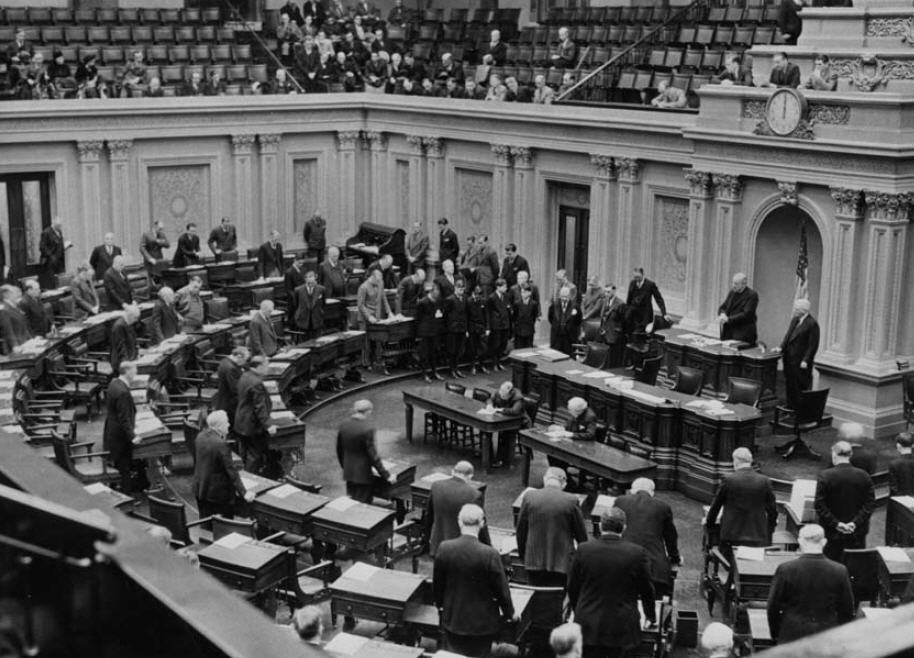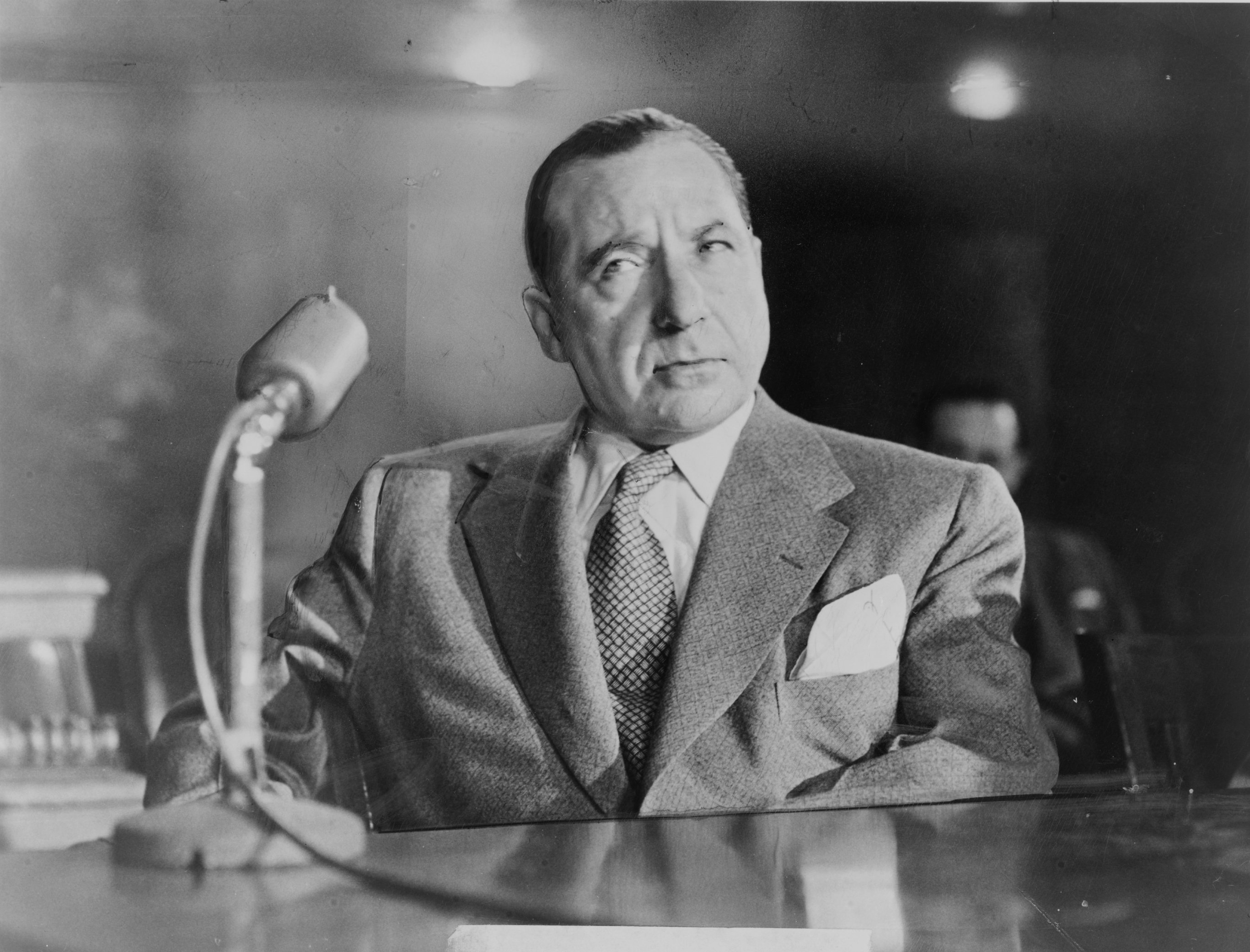|
George W. Gillie
George W. Gillie (August 15, 1880 – July 3, 1963) was an American veterinarian and politician who served five terms as a United States House of Representatives, U.S. Representative from Indiana from 1939 to 1949. Biography Born in Berwickshire, Scotland, Gillie moved to the United States with his parents, who settled in Kankakee, Illinois, in 1882 and in Fort Wayne, Indiana, in 1884. He attended the public schools, International Business College, Fort Wayne, Indiana, in 1898, and Purdue University, Lafayette, Indiana from 1899 to 1901. He was graduated from Ohio State University at Columbus in 1907 as doctor of veterinary surgery. Meat and dairy inspector of Allen County, Indiana from 1908 to 1914. Began the practice of veterinary medicine in Fort Wayne, Indiana, in 1914. Sheriff of Allen County 1917-1920 from 1929 to 1930, and 1935-1937. Congress Gillie was elected as a Republican Party (United States), Republican to the 76th United States Congress, Seventy-sixth and to the f ... [...More Info...] [...Related Items...] OR: [Wikipedia] [Google] [Baidu] |
76th United States Congress
The 76th United States Congress was a meeting of the legislative branch of the United States federal government, composed of the United States Senate and the United States House of Representatives. It met in Washington, DC from January 3, 1939, to January 3, 1941, during the seventh and eighth years of Franklin D. Roosevelt's presidency. The apportionment of seats in the House of Representatives was based on the Fifteenth Census of the United States in 1930. Both chambers had a Democratic majority - holding a supermajority in the Senate, but a greatly reduced majority in the House, thus losing the supermajority there. With President Roosevelt, the Democrats maintained an overall federal government trifecta. The 76th is also the most recent Congress to have held a third session. Major events * April 9, 1939: African-American singer Marian Anderson performs before 75,000 people at the Lincoln Memorial in Washington, D.C., after having been denied the use both of Constitu ... [...More Info...] [...Related Items...] OR: [Wikipedia] [Google] [Baidu] |
Politicians From Fort Wayne, Indiana
A politician is a person active in party politics, or a person holding or seeking an elected office in government. Politicians propose, support, reject and create laws that govern the land and by an extension of its people. Broadly speaking, a politician can be anyone who seeks to achieve political power in a government. Identity Politicians are people who are politically active, especially in party politics. Political positions range from local governments to state governments to federal governments to international governments. All ''government leaders'' are considered politicians. Media and rhetoric Politicians are known for their rhetoric, as in speeches or campaign advertisements. They are especially known for using common themes that allow them to develop their political positions in terms familiar to the voters. Politicians of necessity become expert users of the media. Politicians in the 19th century made heavy use of newspapers, magazines, and pamphlets, as well ... [...More Info...] [...Related Items...] OR: [Wikipedia] [Google] [Baidu] |
Indiana Sheriffs
Indiana () is a U.S. state in the Midwestern United States. It is the 38th-largest by area and the 17th-most populous of the 50 States. Its capital and largest city is Indianapolis. Indiana was admitted to the United States as the 19th state on December 11, 1816. It is bordered by Lake Michigan to the northwest, Michigan to the north, Ohio to the east, the Ohio River and Kentucky to the south and southeast, and the Wabash River and Illinois to the west. Various indigenous peoples inhabited what would become Indiana for thousands of years, some of whom the U.S. government expelled between 1800 and 1836. Indiana received its name because the state was largely possessed by native tribes even after it was granted statehood. Since then, settlement patterns in Indiana have reflected regional cultural segmentation present in the Eastern United States; the state's northernmost tier was settled primarily by people from New England and New York, Central Indiana by migrants from the ... [...More Info...] [...Related Items...] OR: [Wikipedia] [Google] [Baidu] |
Ohio State University College Of Veterinary Medicine Alumni
Ohio () is a state in the Midwestern region of the United States. Of the fifty U.S. states, it is the 34th-largest by area, and with a population of nearly 11.8 million, is the seventh-most populous and tenth-most densely populated. The state's capital and largest city is Columbus, with the Columbus metro area, Greater Cincinnati, and Greater Cleveland being the largest metropolitan areas. Ohio is bordered by Lake Erie to the north, Pennsylvania to the east, West Virginia to the southeast, Kentucky to the southwest, Indiana to the west, and Michigan to the northwest. Ohio is historically known as the "Buckeye State" after its Ohio buckeye trees, and Ohioans are also known as "Buckeyes". Its state flag is the only non-rectangular flag of all the U.S. states. Ohio takes its name from the Ohio River, which in turn originated from the Seneca word ''ohiːyo'', meaning "good river", "great river", or "large creek". The state arose from the lands west of the Appalachian Mountai ... [...More Info...] [...Related Items...] OR: [Wikipedia] [Google] [Baidu] |
1963 Deaths
Events January * January 1 – Bogle–Chandler case: Commonwealth Scientific and Industrial Research Organisation scientist Dr. Gilbert Bogle and Mrs. Margaret Chandler are found dead (presumed poisoned), in bushland near the Lane Cove River, Sydney, Australia. * January 2 – Vietnam War – Battle of Ap Bac: The Viet Cong win their first major victory. * January 9 – A total penumbral lunar eclipse is visible in the Americas, Europe, Africa, and Asia, and is the 56th lunar eclipse of Lunar Saros 114. Gamma has a value of −1.01282. It occurs on the night between Wednesday, January 9 and Thursday, January 10, 1963. * January 13 – 1963 Togolese coup d'état: A military coup in Togo results in the installation of coup leader Emmanuel Bodjollé as president. * January 17 – A last quarter moon occurs between the penumbral lunar eclipse and the annular solar eclipse, only 12 hours, 29 minutes after apogee. * January 19 – Soviet spy Gheorghe ... [...More Info...] [...Related Items...] OR: [Wikipedia] [Google] [Baidu] |
1880 Births
Year 188 (CLXXXVIII) was a leap year starting on Monday of the Julian calendar. At the time, it was known in the Roman Empire as the Year of the Consulship of Fuscianus and Silanus (or, less frequently, year 941 ''Ab urbe condita''). The denomination 188 for this year has been used since the early medieval period, when the Anno Domini calendar era became the prevalent method in Europe for naming years. Events By place Roman Empire * Publius Helvius Pertinax becomes pro-consul of Africa from 188 to 189. Japan * Queen Himiko (or Shingi Waō) begins her reign in Japan (until 248). Births * April 4 – Caracalla (or Antoninus), Roman emperor (d. 217) * Lu Ji (or Gongji), Chinese official and politician (d. 219) * Sun Shao, Chinese general of the Eastern Wu state (d. 241) Deaths * March 17 – Julian, pope and patriarch of Alexandria * Fa Zhen (or Gaoqing), Chinese scholar (b. AD 100) * Lucius Antistius Burrus, Roman politician (executed) * Ma Xiang, Chin ... [...More Info...] [...Related Items...] OR: [Wikipedia] [Google] [Baidu] |
Edward H
Edward is an English given name. It is derived from the Anglo-Saxon name ''Ēadweard'', composed of the elements '' ēad'' "wealth, fortune; prosperous" and '' weard'' "guardian, protector”. History The name Edward was very popular in Anglo-Saxon England, but the rule of the Norman and Plantagenet dynasties had effectively ended its use amongst the upper classes. The popularity of the name was revived when Henry III named his firstborn son, the future Edward I, as part of his efforts to promote a cult around Edward the Confessor, for whom Henry had a deep admiration. Variant forms The name has been adopted in the Iberian peninsula since the 15th century, due to Edward, King of Portugal, whose mother was English. The Spanish/Portuguese forms of the name are Eduardo and Duarte. Other variant forms include French Édouard, Italian Edoardo and Odoardo, German, Dutch, Czech and Romanian Eduard and Scandinavian Edvard. Short forms include Ed, Eddy, Eddie, Ted, Teddy and Ned. Pe ... [...More Info...] [...Related Items...] OR: [Wikipedia] [Google] [Baidu] |
James Indus Farley
James Indus Farley (February 24, 1871 – June 16, 1948) was an American educator, businessman, and a three-term member of the United States Congress from Indiana from 1933 to 1939. Biography Born on a farm near Hamilton, Indiana, he attended Tri-State College in nearby Angola, and Simpson College in Indianola, Iowa. After four years of teaching school, he went to work for the Auburn Automobile Company and rose to become the company's president. Political career In 1928, he entered politics as a delegate to the Democratic National Convention. He was elected to Congress in 1932 from the Fourth District, defeating incumbent Republican David Hogg. He was re-elected twice before losing to Republican George W. Gillie in 1938. Death He died in Bryn Mawr, Pennsylvania, and is buried in Woodlawn Cemetery, Auburn, Indiana Auburn is a city in DeKalb County, Indiana, United States. The population was 13,820 at the 2020 census. Founded in 1836 by Wesley Park (1811–1868), the ... [...More Info...] [...Related Items...] OR: [Wikipedia] [Google] [Baidu] |
81st United States Congress
The 81st United States Congress was a meeting of the legislative branch of the United States federal government, composed of the United States Senate and the United States House of Representatives. It met in Washington, D.C. from January 3, 1949, to January 3, 1951, during the fifth and sixth years of Presidency of Harry S. Truman, Harry S. Truman's presidency. The apportionment of seats in this United States House of Representatives, House of Representatives was based on the United States Census, 1940, Sixteenth Census of the United States in 1940. The Democratic Party (United States), Democrats won back the majority in both chambers, and with the election of U.S. President, President Harry S. Truman to his own full term in office, this gave the Democrats an overall federal government government trifecta#United States, trifecta. Major events * January 20, 1949: President Harry S. Truman began his second (only full) term. * August 16, 1949: Office of Chairman of the Joint C ... [...More Info...] [...Related Items...] OR: [Wikipedia] [Google] [Baidu] |
Republican Party (United States)
The Republican Party, also referred to as the GOP ("Grand Old Party"), is one of the two major contemporary political parties in the United States. The GOP was founded in 1854 by anti-slavery activists who opposed the Kansas–Nebraska Act, which allowed for the potential expansion of chattel slavery into the western territories. Since Ronald Reagan's presidency in the 1980s, conservatism has been the dominant ideology of the GOP. It has been the main political rival of the Democratic Party since the mid-1850s. The Republican Party's intellectual predecessor is considered to be Northern members of the Whig Party, with Republican presidents Abraham Lincoln, Rutherford B. Hayes, Chester A. Arthur, and Benjamin Harrison all being Whigs before switching to the party, from which they were elected. The collapse of the Whigs, which had previously been one of the two major parties in the country, strengthened the party's electoral success. Upon its founding, it supported c ... [...More Info...] [...Related Items...] OR: [Wikipedia] [Google] [Baidu] |




